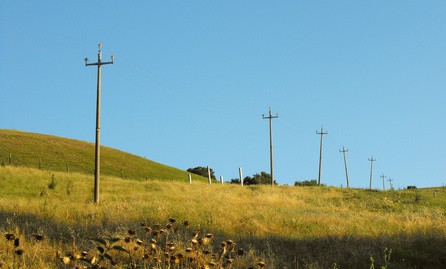 A business news service that has traditionally supported private, free-market business interests has called on the government to declare broadband essential for navigating daily life and to get more involved in assuring every American has access to it.
A business news service that has traditionally supported private, free-market business interests has called on the government to declare broadband essential for navigating daily life and to get more involved in assuring every American has access to it.
The editorial board of Bloomberg News published an extraordinary opinion piece this morning urging government involvement and oversight to resolve the rural broadband gap once and for all.
It is often said that internet service, like electricity or water, should be treated (and regulated) more like a public utility. Without wading into the contentious and long-running debate about that, it’s easy enough to point out that the government can do more, at the margins, to help bring better internet service to places where the market hasn’t. Fast internet service is to the 21st century what a telephone line was to the 20th: essential to navigating daily life.
The editors point out that 39% of rural America — 23 million people — still lack suitable internet access despite years of speeches from politicians, targeted or restricted-use public funding, government grants, and public-private “partnerships.”
Bloomberg rightly calls out the biggest impediment to rural broadband expansion — funding for last-mile infrastructure projects that actually deliver broadband service to unserved homes and businesses, not just public institutions or exclusive office parks. Because private phone companies (and to a lesser degree cable operators) either do not want the funding to come with strings attached or seek taxpayer funds to transfer the cost of rural investment away from shareholders and on to the government, the results have been patchy service and scandals.
Some companies, like Verizon, have shown almost no interest in government subsidies to further expand DSL service into its most rural territories. Others, like Frontier Communications, are aggressively seeking funding to defray the cost of wiring rural areas and, alleges one government oversight report, discovered a ‘revenue opportunity’ for itself along the way.
A report by the U.S. Commerce Department’s Office of Inspector General alleged Frontier has become an expert on gaming the system with padded invoices that overcharged a federal grant program $4.7 million dollars. Company employees reportedly even boasted about their ability to creatively ripoff taxpayers:
The scathing, 31-page report declared the payments “unreasonable” and “unallowable.” Meanwhile, Frontier saw the tacked-on charges as a “revenue opportunity,” according to an internal company email cited in the report. Frontier employees referred to the extra fees as “markups” and “profit.”
 Bloomberg’s editors think the FCC should keep rural broadband expansion funding simple and avoid favoring one technology over another. Various grant programs have failed in the past because they are exceptionally specific about the kinds of technologies that qualify for funding, set unreasonable deadlines, improperly vet the financial capabilities of applicants, and attract some applicants that tailor-write applications to fit funding opportunities instead of creating sustainable and meaningful projects that can remain solvent and operating after the grant funding ends.
Bloomberg’s editors think the FCC should keep rural broadband expansion funding simple and avoid favoring one technology over another. Various grant programs have failed in the past because they are exceptionally specific about the kinds of technologies that qualify for funding, set unreasonable deadlines, improperly vet the financial capabilities of applicants, and attract some applicants that tailor-write applications to fit funding opportunities instead of creating sustainable and meaningful projects that can remain solvent and operating after the grant funding ends.
The different approach advocated by Bloomberg calls on the government to set goals and benchmarks and avoid micromanaging how applicants achieve them. For example, Bloomberg supports the FCC’s 25Mbps minimum definition of broadband, but could care less how providers deliver that speed to rural consumers — via satellite, cable, or something else. It also thinks the current grant system favors incumbent rural phone companies and that has not benefited consumers. Bloomberg’s editors believe startups can bring innovative solutions to rural broadband problems that rural phone companies may not have the ability or flexibility to deliver themselves.
Some comments on the piece believe Bloomberg can find its “win-win” solution to the problem by targeting funding on rural, member-owned energy and telephone co-ops, instead of investor-owned utilities like Frontier, CenturyLink, and Windstream.
“The same entities that were responsible for bringing power to rural areas would be the perfect vehicle for stringing internet cable to those same customers,” wrote one commenter. “Namely, the rural electric co-ops who continue to serve this vital need.”


 Subscribe
Subscribe
I really wish that these companies told wall street to f**k off and do what they feel is right to retain customers. Self-aggrandizing douchenozzles such as Craig Moffett are the reason why we have economic and broadband disparities in this country.
You (Bloomburg) had me in your corner in 100% support of your views and findings right up until the end…when you stated: “Bloomberg supports the FCC’s 25Mbps minimum definition of broadband, but could care less how providers deliver that speed to rural consumers — via satellite, cable, or something else.” That is the wrong position. A little research and reading from sites like here and elsewhere and you will quickly learn that 25Mbps delivered to a rural home via cable wire or fibre-to-the-home is a vastly different experience in consistency and speed and reliability over the Satellite “fraudband”, Wireless LTE… Read more »
Kevin S that is not a fair judgement to make. You just have to put requirements on the 25mbps which should be on all providers anyways. Simple requirements like 25mbps 95% of the time with 95% up time. If they can’t achieve that then they have to refund the money. All those technologies have the capability of consistent up time and speeds if they are utilized properly. The other medians just happen to do what cable companies and even telecos do which is stuff there networks with to many customers which creates peak usage problems. Couple that is with a… Read more »
EJ, all too often, "technology agnostic" seems to be a codeword for the same DSL and fixed wireless technologies that have (in the case of DSL) failed to deliver improvements in speed beyond 1 or 2 Mbps for many users, and (in the case of fixed wireless and wireless local loop) have failed to get significant market penetration, despite a huge professed enthusiasm on the part of Big Telecom as well as local providers. Anyone who wants to advocate these in 2017 had better have a very good story, because they have a long list of broken promises to live… Read more »
Paul you are 100% percent correct, but like I said the reason that fixed wireless is a failure is a lack of investment. You can make fixed wireless work for an addition under the correct circumstances. Fiber to the fixed product and on a tall enough pole to broadcast out correctly and most importantly of them all don’t stress the node with to many customers. Also with the advent of 4g and 5g telecommunications could use the free air frequencies to come up with wireless that would work a lot like a hot spot on steroids. The technology is defiantly… Read more »